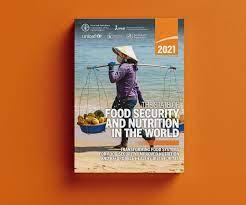
The SOFI 2021 report will also focus on complementary food system solutions that address the key drivers of food insecurity and malnutrition, i.e. conflict, climate variability and extremes, economic slowdowns and downturns, and COVID-19, and that ensure access to affordable healthy diets for all. It will look in-depth at six transformative pathways to achieve this, drawing upon best practices and lessons learned from around the world.
Is the world on track to achieve Zero Hunger?
Well before the COVID-19 pandemic, the world was already not on track to ending world hunger and malnutrition in all its forms by 2030. The COVID-19 pandemic, and the measures to restrain it have dramatically magnified and increased these challenges. We are now at a critical moment in time that requires new food system approaches and urgent actions at scale to get back on track towards achieving SDG-2 and other SDGs.
What's new?
- The first comprehensive assessment of the state of hunger and food insecurity for 2020 based on fresh data collected around the world in a year heavily impacted by the COVID-19 pandemic.
- Projections of what the number of undernourished people may look like in 2030 that attempt to account for the estimated impact of the COVID-19 pandemic on hunger in 2020 and the projected economic recovery in 2021.
- Updated estimates for several nutrition indicators and projections to 2030.
- Updated estimates of the cost and affordability of a healthy diet.
- Synthesis understanding of the major drivers behind the global food security and nutrition trends, but framed around food systems thinking.
The report is presented by the Food and Agriculture Organization of the United Nations, the International Fund for Agricultural Development, the United Nations Children's Fund, the World Food Programme and the World Health Organization. SOFI 2021 will be translated into all United Nations official languages.
How to register for the event?
Please click here to register.
More information can be found here.










Add new comment